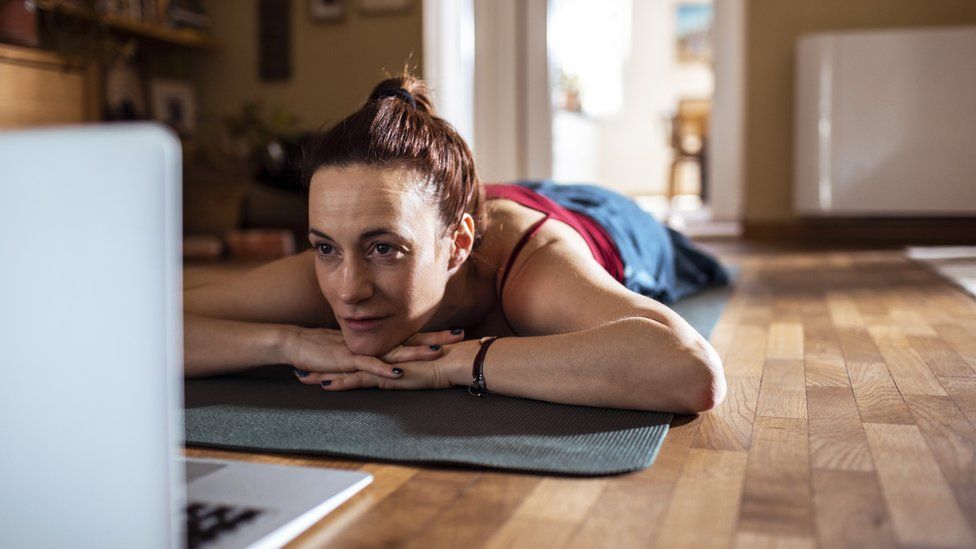Coronavirus: Extremely vulnerable advised not to go to work from Thursday
- Published
- comments

Clinically extremely vulnerable people in England are being strongly advised not to go to work outside their homes during lockdown from Thursday.
Under updated government guidance, they should only go out for exercise and to attend health appointments.
People with stage-five chronic kidney disease, those undergoing dialysis and adults with Down's syndrome are now also advised to follow the advice.
This group is at higher risk from Covid-19 than the general population.
The government will give local councils in England more than £32m to fund support and access to local services for more than 2.24 million clinically extremely vulnerable people.
They include people undergoing treatment for serious medical conditions, such as certain cancers, or those with rare diseases.
This number could rise by 80,000 over the next few weeks, as NHS England sends letters to those affected.
- PAY-PACKET SUPPORT: What do chancellor's plans mean for wages?
- SUPPORT BUBBLES: What are they and who can be in yours?
- SCHOOLS: What will happen if children catch coronavirus?
- YOUR QUESTIONS: We answer your queries
- TREATMENT: How close are we to helping people?
New national restrictions will apply to everyone in England from 00:01 on Thursday, 5 November, until Wednesday 2 December.
The updated guidance for clinically extremely vulnerable people strongly advises:
- Stay at home as much as possible, although people can exercise outside in their support bubble
- Avoid all non-essential travel, except to GP and hospital appointments unless told otherwise
- Don't go to any shops or pharmacies
- Don't go to work if you cannot work from home - you may be eligible for statutory sick pay or other allowances - but people in the same household can still attend work
- Most children who were shielding no longer need to be and can go to school - but parents should check with their GP if they are unsure
- Children who live with someone who is clinically extremely vulnerable should still go to school
'Late in the day'
An online support service has been set up to help people in this group access supermarket deliveries and other local support.
Asthma UK and the British Lung Foundation said the guidance was "a step forward" but had given people less than 24 hours to prepare for the changes to their lives.
"While it's good news that furlough is still an option for some, it is very late in the day for people to be having this discussion with their employers and there is no guarantee that everyone who needs it will be able to access it," said Sarah MacFadyen, head of policy.
She said it was vital that no one was left without essentials and delivery systems were easy to access.
The clinically extremely vulnerable group includes:
- solid organ transplant recipients
- people with specific cancers
- people having active chemotherapy for cancer
- people having radical radiotherapy for lung cancer
- people having any treatment for cancers of the blood or bone marrow, such as leukaemia, lymphoma or myeloma
- people having immunotherapy or other continuing antibody treatments for cancer
- people having other targeted cancer treatments that can affect the immune system, such as protein kinase inhibitors or PARP inhibitors
- people who have had bone marrow or stem-cell transplants in the past six months or are still taking immunosuppression drugs
- people with severe respiratory conditions, including all cystic fibrosis, severe asthma and severe chronic obstructive pulmonary disease (COPD)
- people with rare diseases that significantly increase the risk of infections, such as severe combined immunodeficiency (SCID) or homozygous sickle cell
- people on immunosuppression therapies sufficient to significantly increase risk of infection
- adults with Down's syndrome
- adults on dialysis or with chronic kidney disease (stage five)
- pregnant women with significant congenital or acquired heart disease
- others classed as clinically extremely vulnerable based on clinical judgement and an assessment of their needs - GPs and hospital clinicians have been provided with guidance to support these decisions
The over 70s, pregnant women and people who are very obese are not included in this group - they are classified as clinically vulnerable. They may still be more at risk of Covid-19 and are advised to stay at home as much as possible and minimise contact with others.